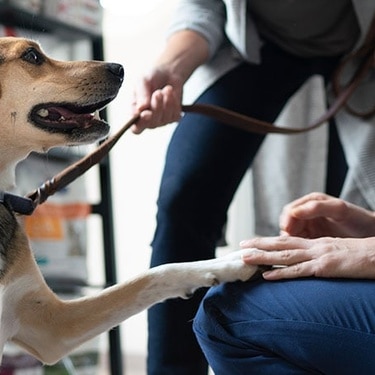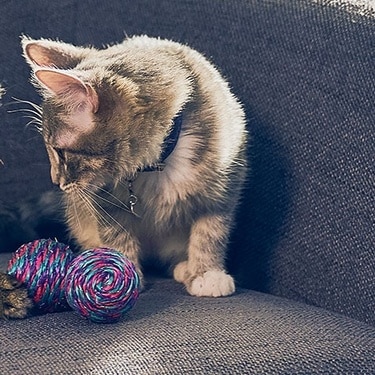
-
Hitta rätt mat för ditt husdjurGör det här testet för att se vilket foder som kan vara bäst för din pälskling.Hitta rätt mat för ditt husdjurGör det här testet för att se vilket foder som kan vara bäst för din pälskling.Utvalda produkter
 Hypoallergeniskt hundfoder för vuxna hundar med lax
Hypoallergeniskt hundfoder för vuxna hundar med laxHILL'S SCIENCE PLAN Hypoallergenic Large Breed Adult hundfoder med lax är ett komplett foder för vuxna hundar av stora raser i åldern 1–5 år. Det är särskilt framtaget för hundar med känslig hud och mage, med begränsade mängder högkvalitativa och nya proteinkällor samt utan spannmål.
Handla nu Healthy Mobility Medium Adult Hundfoder
Healthy Mobility Medium Adult HundfoderHill's Science Plan Healthy Mobility Medium Breed Adult Hundfoder med kyckling erbjuder en avancerad nutrition för att stödja ledhälsa och förbättra rörligheten. provides advanced nutrition to support joint health and improve mobility.
Handla nu Hypoallergenic Adult Hundfoder
Hypoallergenic Adult HundfoderHill's Science Plan Hypoallergenic Adult våtfoder med lax är ett komplett helfoder av högsta kvalitet för alla vuxna hundar från 1 år och uppåt. Detta läckra våtfoder i burk är speciellt sammansatt för hundar med känslig hud och mage. Den innehåller en enda animalisk proteinkälla och är spannmålsfri.
Handla nuHälsotillståndUtvalda produkter Hill's Science Plan Sterilised Mature Adult Kattfoder Kyckling & Havsfisk
Hill's Science Plan Sterilised Mature Adult Kattfoder Kyckling & HavsfiskHill's Science Plan Sterilised Cat Mature Adult våtfoder med havsfisk är ett komplett helfoder för steriliserade katter över sju år.
Handla nu Hill's Science Plan Healthy Cuisine Kattungefoder Kyckling & Havsfisk
Hill's Science Plan Healthy Cuisine Kattungefoder Kyckling & HavsfiskScience Plan Healthy Cuisine stews är 100% balanserad och hälsosamt våtfoder, med oemotståndlig smak som kattungar älskar.
Handla nu Hill's Sceince Plan Feline Kitten kyckling med havsfisk
Hill's Sceince Plan Feline Kitten kyckling med havsfiskMjuka bitar i sås för kattungar, med omega-3 för hälsosam ögon- och hjärnutveckling och högkvalitativt protein för att stödja muskeltillväxt. Med balanserade mineraler för att främja starkt skelett och starka tänder.
Handla nu -
Till hundägare
- Tips och artiklar
-
Hälsokategori
- Vikthantering
- Miljö- och foderöverkänslighet
- Urinvägar
- Matsmältning
- Leder
- Njurar
-
Hundens livsstadium
- Näring för valpar
- Näring för vuxna katter
- Näring för seniorer
Till kattägare- Tips och artiklar
-
Hälsokategori
- Vikthantering
- Hud- & foderöverkänslighet
- Urinvägar
- Matsmältning
- Njurar
-
Kattens livsstadium
- Näring för kattungar
- Näring för vuxna
- Näring för seniorer
Utvalda artiklar Kristaller och stenar i hund- och katturin
Kristaller och stenar i hund- och katturinLäs om orsaker till och behandlingar av kristaller i hund- och katturin för att bibehålla hundens eller kattens hälsa. För expertråd om urinvård, besök Hill's Pet Sverige.
Läs mer Virtual Vet Visits: What You Need to Know
Virtual Vet Visits: What You Need to KnowLearn the ins and outs of a televet appointment before you talk to a vet online.
Läs mer Viktförändringar hos hundar och katter - kan det vara ett sköldkörtelproblem?
Viktförändringar hos hundar och katter - kan det vara ett sköldkörtelproblem?En viktförändring kan tyda på ett problem med sköldkörteln. Läs mer om tecken, orsaker och vad du kan göra åt det.
Läs mer -


 You'll want your kitten to become a cat that relates well to people and is a friend and companion. To achieve this, you need to bear in mind that cats have a very short socialization phase. So the first four to 16 weeks of life are a critical time for behavioral and social development.
You'll want your kitten to become a cat that relates well to people and is a friend and companion. To achieve this, you need to bear in mind that cats have a very short socialization phase. So the first four to 16 weeks of life are a critical time for behavioral and social development.
Your kitten's early experiences
Before your kitten comes to live with you, she will have been interacting with her mother, the other kittens in her litter and probably several different people.
Be wary of choosing a kitten that has had little human contact, such as a kitten that has been raised in a shed or pen far from the house. Kittens need to get used to being handled by people very early on, preferably by several people so they don't just learn to accept a single caregiver. They also need to become accustomed to the sights, smells and sounds of everyday life.
Your kitten will probably move into your home when she's about eight to 12 weeks of age. Assuming she's already had lots of human contact, it shouldn't be too difficult for you to reinforce all the good work and help her grow into a friendly, happy, confident cat.
When your kitten first arrives home with you, remember it can all be a bit overwhelming for her. Take her to a quiet, safe place and show her where her bowls and litter boxes are. Give her lots of love and reassurance and pet her gently, talking to her in a soft, calm voice. Playing is also a great way to socialize your kitten and form a bond with her early on in your relationship.
Kids and kittens
Your kitten should be socialized with children as early as possible, as she may reject or bite them later if she hasn't become used to them early on.
If you have children, they will naturally be very excited about the arrival of a new kitten. Your job is to teach them that your kitten is not a toy and must be treated carefully. Play time must end when the kitten has had enough. It's also a good idea to warn the children that she may scratch or play-bite.
Your kitten and other people
People come in all different shapes and sizes and your kitten should have the opportunity to encounter them all. Get her used to strangers but be careful that they don't scare or overwhelm her with a strong show of affection.
It's a good idea to introduce your young kitten to as many people as possible. That way, you're likely to avoid her developing a fear of strangers in later life.


Smakrika tips
Kattungar kan behöva flera besök under sitt första år för vaccinationer. Vuxna katter har i allmänhet nytta av årliga kontroller, medan seniorkatter eller katter med särskilda behov kan behöva mer frekventa besök.
Don't forget that kittens can become tired quickly; make sure that meeting times with new people are kept quite short so your kitten has time to rest.
Introducing your kitten to other pets in the home
Before introducing your new kitten to other pets in your household, visit your veterinarian to ensure all pets are healthy and their vaccinations are up to date.
Smell is the most important sense for cats, so it's a good idea to transfer some of the smells of your home onto the coat of your new kitten before the introductions. Mix the scents by stroking first your resident cat, then the kitten, without washing your hands, and vice versa.
Introduce your new kitten to other pets gradually and one at a time. Keeping your new kitten in a carrier or behind an expandable baby gate is a good way to supervise the first encounter.
During the introduction, separate the pets at any sign of aggression. Acceptance may take time, so never leave your new kitten unsupervised with any of your other pets until you are certain they get along well. Always keep smaller pets, such as hamsters, fish and birds safely out of reach.
Separation anxiety
The good news is, you've done a great job raising your kitten to get along well with people. The bad news is, she's now so attached to you, she won't like it when you go out.
Separation anxiety, previously only recognized in dogs, is now acknowledged to occur in cats. Signs that your kitten may be suffering from separation anxiety include seeming stressed by you going out. She could be excessively vocal perhaps or soil the house in your absence.
Tips on dealing with separation anxiety include limiting the time you leave your kitten alone as much as you possibly can and trying not to make a big "production" out of leaving the house. If your kitten does soil the house, don't punish her. Cats don't understand punishment and, since her behavior is a result of stress, you'll actually be making the problem worse.
You can easily teach your kitten to tolerate short absences by leaving her in a room, closing the door and walking away. After a few minutes, go back in but don't greet her. When you've done this several times, extend the absences to 30 minutes. But if she begins to get distressed, and starts meowing or scratching at the door, you should shorten the absence period.


En av våra skribenter förberedde den här artikeln åt dig
Relaterade produkter


Hill's Science Plan Adult kattfoder med lax är ett helfoder för äldre katter, speciellt utformat med ActivBiome+ Multi-Benefit teknologi.
Detta foder främjar ett värdigt åldrande hos katter och innehåller en synergistisk blandning av ingredienser som bidrar till att upprätthålla energi- och aktivitetsnivån.

Hill's SCIENCE PLAN Sterilised Kitten kattungefoder är skapat med Hill´s unika förståelse för de specifika behov som kastrerade kattungar har. Det bidrar med hög proteinkvalitet för muskelutveckling, med kontrollerat fett för att förebygga risk för övervikt efter kastrering. Dessutom har det en unik blandning av antioxidanter för att främja ett hälsosamt immunsystem för att stöjda din kattunges tillväxt.

Hill's Science Plan Perfect Digestion Foder till Kattungar med Kyckling & Fullkornsris ger näring åt din kattunges unika mikrobiom och hjälper dem att nå sin fulla potential.
Relaterade artiklar

Discover how to train your cat, starting with very basic first steps that both reward good behavior and discourage the bad. It

Lär dig mer om orsakerna till hårbollar hos katter och upptäck effektiva behandlingar för att hålla din katt frisk. Besök Hill's Pet Sverige för fler råd om katters hälsa.

Are you looking to get your cat more active? Does she constantly look bored? Then you may want to consider using a food-dispensing (also known as treat-dispensing) cat toy, which provides both physical and mental stimulation during snack times.

Upptäck roliga och engagerande spel för katter som även fungerar som bra motionskällor. Utforska spännande sätt att hålla din katt aktiv och underhållen!

Sätt din katt på diet utan att den märker det
Vår kalorifattiga sammansättning hjälper dig att kontrollera din katts vikt. Den innehåller högkvalitativt protein för att bygga slanka muskler och är tillverkad med noga utvalda ingredienser för en smakrik och näringsrik måltid. Kliniskt bevisade antioxidanter, vitamin C+E, bidrar till ett friskt immunförsvar.
Sätt din katt på diet utan att den märker det
Vår kalorifattiga sammansättning hjälper dig att kontrollera din katts vikt. Den innehåller högkvalitativt protein för att bygga slanka muskler och är tillverkad med noga utvalda ingredienser för en smakrik och näringsrik måltid. Kliniskt bevisade antioxidanter, vitamin C+E, bidrar till ett friskt immunförsvar.

